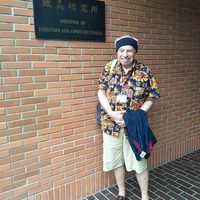
Ryan O Tayco
Asst. Prof. IVNegros Oriental State UniversityStudied Ph.D. in International Hospitality Management at Lyceum of the Philippines UniversityStudied Doctor of Management in Human Resource Management at Negros Oriental State UniversityStudied MSBA in Hospitality Management at University of the Visayas Studied Bachelor of Science in Hotel and Restaurant Management at Negros Oriental State University
Supervisors: Chair, Hospitality Management Department
Supervisors: Chair, Hospitality Management Department
less
Related Authors
Noel B. Salazar
KU Leuven
C. Michael Hall
University of Canterbury/Te Whare Wānanga o Waitaha
David Seamon
Kansas State University
Armando Marques-Guedes
UNL - New University of Lisbon
Kirsten Jacobson
University of Maine
Michael Dietler
University of Chicago
Rob S E A N Wilson
University of California, Santa Cruz
Scott Cohen
University of Algarve
Cymene Howe
Rice University
Noemi Marujo
Universidade de Évora










Uploads
Papers by Ryan O Tayco
Keywords: tourism industry, accommodation facilities, food and beverage establishments, descriptive method, Negros Oriental
Keywords – tourism and hospitality industry, service quality, resorts, descriptive-correlational design, Central Philippines
Keywords: Hospitality management, HRM practices, organizational outcomes, correlational research, Central Philippines
implemented will result in the attainment of desired outcomes. This study tries to explore the self-efficacy of hotel personnel
to disaster in Dumaguete City, Philippines using a descriptive survey. A total of 167 respondents answered the survey
questionnaire; 27 respondents are the top management and 140 are rank and file personnel, they were chosen through
systematic random sampling. The result shows that the respondents had no emergency management experience but
apparently, there is an existence of an emergency management plan in their organization. It reveals that most of the
respondent’s self-efficacy belief in their preparedness for a disaster is very satisfactory. The respondents have confidence in
their capabilities to act on their preparedness before, during, and after the disaster. That is, those respondents who have a
higher level of self-efficacy are more likely to prepare for disasters and believe that they will respond effectively in a disaster
situation.
Keywords: descriptive study; self-efficacy; disaster; hotel industry; Dumaguete City
Schools or University. Since eating right is a fundamental human right, including and most notably of the students, the
constitutional privilege should not take for granted by food providers. This descriptive research used a survey questionnaire
to gathered data from the students of Negros Oriental State University, Dumaguete City. 1, 382 respondents answered the
survey questionnaire from the eight (8) different colleges in NORSU. They were chosen as respondents through systematic
random sampling. Descriptive statistics were used to describe the basic features of the data in a study. Weighted mean and
standard deviation was also used to simple summaries about the sample and the measures. Regression analysis was used to
conduct the multivariate analysis to test the conceptual framework of the study. The result shows that the respondents neither
agree nor disagree on perceived risk on street food and consumer buying behavior. This study also shows the relationship
between street food's perceived risk and consumer buying behavior is significant. It means that there is a significant
relationship that exists between street foods' perceived risk and consumer buying behavior. The results of the regression
analysis between predictors of consumers' buying behavior show that food handling practices such as personal hygiene, food
preparation, and food storage shows significant effects of perceived risk on consumers’ buying behavior.
Keywords: perceived risks; consumer buying behavior; street food; descriptive study; regression analysis; NORSU;
Dumaguete City
Keywords: tourism industry, accommodation facilities, food and beverage establishments, descriptive method, Negros Oriental
Keywords – tourism and hospitality industry, service quality, resorts, descriptive-correlational design, Central Philippines
Keywords: Hospitality management, HRM practices, organizational outcomes, correlational research, Central Philippines
implemented will result in the attainment of desired outcomes. This study tries to explore the self-efficacy of hotel personnel
to disaster in Dumaguete City, Philippines using a descriptive survey. A total of 167 respondents answered the survey
questionnaire; 27 respondents are the top management and 140 are rank and file personnel, they were chosen through
systematic random sampling. The result shows that the respondents had no emergency management experience but
apparently, there is an existence of an emergency management plan in their organization. It reveals that most of the
respondent’s self-efficacy belief in their preparedness for a disaster is very satisfactory. The respondents have confidence in
their capabilities to act on their preparedness before, during, and after the disaster. That is, those respondents who have a
higher level of self-efficacy are more likely to prepare for disasters and believe that they will respond effectively in a disaster
situation.
Keywords: descriptive study; self-efficacy; disaster; hotel industry; Dumaguete City
Schools or University. Since eating right is a fundamental human right, including and most notably of the students, the
constitutional privilege should not take for granted by food providers. This descriptive research used a survey questionnaire
to gathered data from the students of Negros Oriental State University, Dumaguete City. 1, 382 respondents answered the
survey questionnaire from the eight (8) different colleges in NORSU. They were chosen as respondents through systematic
random sampling. Descriptive statistics were used to describe the basic features of the data in a study. Weighted mean and
standard deviation was also used to simple summaries about the sample and the measures. Regression analysis was used to
conduct the multivariate analysis to test the conceptual framework of the study. The result shows that the respondents neither
agree nor disagree on perceived risk on street food and consumer buying behavior. This study also shows the relationship
between street food's perceived risk and consumer buying behavior is significant. It means that there is a significant
relationship that exists between street foods' perceived risk and consumer buying behavior. The results of the regression
analysis between predictors of consumers' buying behavior show that food handling practices such as personal hygiene, food
preparation, and food storage shows significant effects of perceived risk on consumers’ buying behavior.
Keywords: perceived risks; consumer buying behavior; street food; descriptive study; regression analysis; NORSU;
Dumaguete City